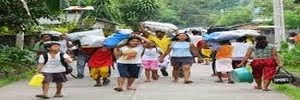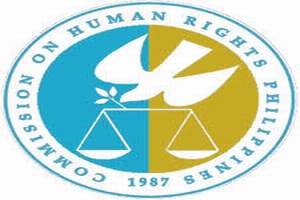links: http://www.dswd.gov.ph/2013/03/mobile-humanitarian-desks-set-up-in-sabah/
Mobile Humanitarian Desks Set-up in Sabah
Posted on 14 March 2013.
President Aquino through Social Welfare and Development
Secretary Corazon Juliano-Soliman and Department of Foreign Affairs
Secretary Albert del Rosario, directed the establishment of a mobile
Humanitarian/Welfare Desk to complement the Rapid Response Teams (RRTs)
in Sabah to respond to the situation of Filipino nationals in Sabah.
Two Rapid Response Teams (RRT1 and RRT2) were deployed in different areas in Sabah where there is a large concentration of Filipinos.
DSWD Secretary Soliman said that RRT1, comprising of DFA personnel and accompanied by DSWD Undersecretary Parisya Hashim-Taradji, Director Dulfie Tobias- Shalim, and Social Welfare Attaché Bernard Bonina visited the Federal Land Development Authority (FELDA).
FELDA Plantations in Sabah and Sarawak, currently employs 451 Filipinos, with some 350 dependents, doing mostly field upkeep and maintenance work.
Secretary Soliman said that based on the report of the humanitarian team, the FELDA management assured the safety and continued employment of Filipinos in the company.
The Secretary added that there are four evacuation centers established inside the FELDA plantations with 1,464 total evacuees broken down as follows: Cenderawasih Gym- 507; Embara Budi – 468; Fajar Harapan – 208; and Gemalapura – 281.
Most of the evacuees are Filipinos but there are Indonesians, Temorese and local villagers as well.
“There are no Filipino FELDA workers in the evacuation centers. The evacuees are either villagers from the conflict area or workers of FELDA’s subcontractors and their family members,” Secretary Soliman stated citing the report of RRT1.
The RRT1 also visited Kampung Batu-Batu , where many villagers expressed their intent to return to the Philippines. Many of them are undocumented and mostly are natives of Tawi-Tawi.
The team conducted group interviews and asked the villagers to accomplish the “Case Intake Forms” to obtain their particulars. The forms will aid in assessing the situation of Filipinos in the villages surrounding FELDA .
In Lahad Datu town
In Lahad Datu, RRT1 interviewed a student from Tawi-Tawi, who requested anonymity. He is working as a vendor at the Pasar Bakyat Lahad Datu wet market. He said that there are more or less 500 Suluks and 400 Bajaus in Kampung Puyot (downtown Lahad Datu) where he lives. Most of them are undocumented and entered Sabah via boats plying the Bongao-Tawi-Tawi route. Most of them earn a living either as market vendors, construction workers or carpenters.
The team also learned that most Filipinos are not affected by the incident and are just in Lahad Datu to earn a living. Some of them fear being wrongfully accused or of being involved in the incident and thus, could lose their livelihoods. Some also are asking how they could obtain documents to be recognized as Filipinos.
Updates from Sandakan
The RRT1 members also visited an informal school in the outskirts of Sandakan where 119 undocumented Filipino children (i.e., Suluks, Bajaus and Bisaya) are studying in two classrooms with volunteer – teachers. The school, unrecognized by Malaysian authorities, is operating on paltry donations from kind-hearted individuals. It does not have basic facilities, such as school clinic and library. However, volunteer -teachers said students at least can learn how to read and write.
The RRT1 informed the teachers that their dilemma will be brought to the attention of the Philippine authorities. Under Malaysian regulations, children of undocumented parents could not be accepted in Malaysian government schools.
Meanwhile, the Rapid Response Team 2 (RRT 2) reported that there also Filipinos who are working in the plantations in Tawau, where there is an estimated 50,000 to 70,000 documented workers and about 20,000 to 30,000 undocumented workers.
The team also learned that round up of Filipino males are being conducted in Sandakan and Semporna which are bastions of Suluk communities. Fearing for their safety, Filipinos from Semporna, Sandakan and Lahad Datu started to evacuate using small boats. More than 500 evacuees are now in Tawi-Tawi and Sulu.
The team met with some 50 Filipinos who are working at Fook Ngiap sawmill at Pasir Puti in Tawau.
Secretary Soliman said that the Filipinos in Tawau were happy to see the team knowing that the Philippine government is concerned about their welfare and that a travel document may be issued to those who do not have legal status in Tawau. ###
Two Rapid Response Teams (RRT1 and RRT2) were deployed in different areas in Sabah where there is a large concentration of Filipinos.
DSWD Secretary Soliman said that RRT1, comprising of DFA personnel and accompanied by DSWD Undersecretary Parisya Hashim-Taradji, Director Dulfie Tobias- Shalim, and Social Welfare Attaché Bernard Bonina visited the Federal Land Development Authority (FELDA).
FELDA Plantations in Sabah and Sarawak, currently employs 451 Filipinos, with some 350 dependents, doing mostly field upkeep and maintenance work.
Secretary Soliman said that based on the report of the humanitarian team, the FELDA management assured the safety and continued employment of Filipinos in the company.
The Secretary added that there are four evacuation centers established inside the FELDA plantations with 1,464 total evacuees broken down as follows: Cenderawasih Gym- 507; Embara Budi – 468; Fajar Harapan – 208; and Gemalapura – 281.
Most of the evacuees are Filipinos but there are Indonesians, Temorese and local villagers as well.
“There are no Filipino FELDA workers in the evacuation centers. The evacuees are either villagers from the conflict area or workers of FELDA’s subcontractors and their family members,” Secretary Soliman stated citing the report of RRT1.
The RRT1 also visited Kampung Batu-Batu , where many villagers expressed their intent to return to the Philippines. Many of them are undocumented and mostly are natives of Tawi-Tawi.
The team conducted group interviews and asked the villagers to accomplish the “Case Intake Forms” to obtain their particulars. The forms will aid in assessing the situation of Filipinos in the villages surrounding FELDA .
In Lahad Datu town
In Lahad Datu, RRT1 interviewed a student from Tawi-Tawi, who requested anonymity. He is working as a vendor at the Pasar Bakyat Lahad Datu wet market. He said that there are more or less 500 Suluks and 400 Bajaus in Kampung Puyot (downtown Lahad Datu) where he lives. Most of them are undocumented and entered Sabah via boats plying the Bongao-Tawi-Tawi route. Most of them earn a living either as market vendors, construction workers or carpenters.
The team also learned that most Filipinos are not affected by the incident and are just in Lahad Datu to earn a living. Some of them fear being wrongfully accused or of being involved in the incident and thus, could lose their livelihoods. Some also are asking how they could obtain documents to be recognized as Filipinos.
Updates from Sandakan
The RRT1 members also visited an informal school in the outskirts of Sandakan where 119 undocumented Filipino children (i.e., Suluks, Bajaus and Bisaya) are studying in two classrooms with volunteer – teachers. The school, unrecognized by Malaysian authorities, is operating on paltry donations from kind-hearted individuals. It does not have basic facilities, such as school clinic and library. However, volunteer -teachers said students at least can learn how to read and write.
The RRT1 informed the teachers that their dilemma will be brought to the attention of the Philippine authorities. Under Malaysian regulations, children of undocumented parents could not be accepted in Malaysian government schools.
Meanwhile, the Rapid Response Team 2 (RRT 2) reported that there also Filipinos who are working in the plantations in Tawau, where there is an estimated 50,000 to 70,000 documented workers and about 20,000 to 30,000 undocumented workers.
The team also learned that round up of Filipino males are being conducted in Sandakan and Semporna which are bastions of Suluk communities. Fearing for their safety, Filipinos from Semporna, Sandakan and Lahad Datu started to evacuate using small boats. More than 500 evacuees are now in Tawi-Tawi and Sulu.
The team met with some 50 Filipinos who are working at Fook Ngiap sawmill at Pasir Puti in Tawau.
Secretary Soliman said that the Filipinos in Tawau were happy to see the team knowing that the Philippine government is concerned about their welfare and that a travel document may be issued to those who do not have legal status in Tawau. ###
DSWD Website
http://www.dswd.gov.ph/
links:
OTHER HUMAN RIGHTS PROMOTIONS WEBSITES
Human Rights Advocacy Promotions | Human RightsHome - Human rights Promotions Website
http://www.humanrightspromotions.co.nr
PROTECTION AND PROMOTION OF HUMAN RIGHTS
------------------------------------------------------------------------------------------------------
--------------------------------------------------------------------------------
------------------------------------------------


























































0 comments:
Post a Comment